Related Research Articles

The Dean Cemetery is a historically important Victorian cemetery north of the Dean Village, west of Edinburgh city centre, in Scotland. It lies between Queensferry Road and the Water of Leith, bounded on its east side by Dean Path and on its west by the Dean Gallery. A 20th-century extension lies detached from the main cemetery to the north of Ravelston Terrace. The main cemetery is accessible through the main gate on its east side, through a "grace and favour" access door from the grounds of Dean Gallery and from Ravelston Terrace. The modern extension is only accessible at the junction of Dean Path and Queensferry Road.

Dugald Stewart was a Scottish philosopher and mathematician. Today regarded as one of the most important figures of the later Scottish Enlightenment, he was renowned as a populariser of the work of Francis Hutcheson and Adam Smith. His lectures at the University of Edinburgh were widely disseminated by his many influential students. In 1783 he was a joint founder of the Royal Society of Edinburgh. In most contemporary documents he is referred to as Prof Dougal Stewart.
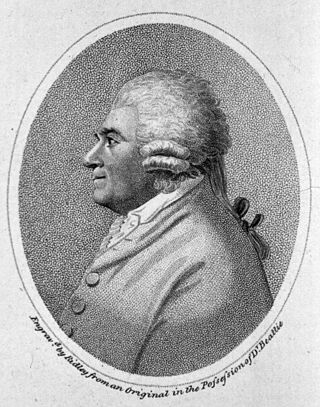
James Beattie was a Scottish poet, moralist, and philosopher.
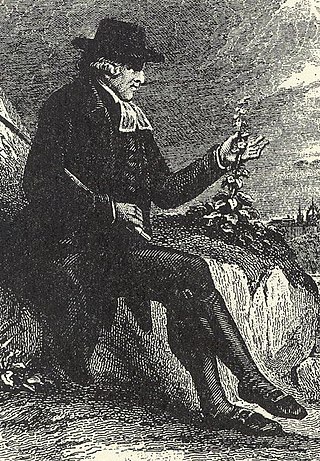
John Walker FRSE (1731–1803) was a Scottish minister and natural historian. He was Regius Professor of Natural history at the University of Edinburgh from 1779 to 1803. He was joint founder of the Royal Society of Edinburgh in 1783 and Moderator of the General Assembly of the Church of Scotland in 1790.
Alexander Gerard FRSE was a Scottish minister, academic and philosophical writer. In 1764 he was the Moderator of the General Assembly of the Church of Scotland.
The Bonny Birdy is Child ballad 82.

James Gregory FRSE FRCPE was a Scottish physician and classicist.

John Gregory, a.k.a. John Gregorie, was an eighteenth-century Scottish Enlightenment physician, medical writer and moralist.
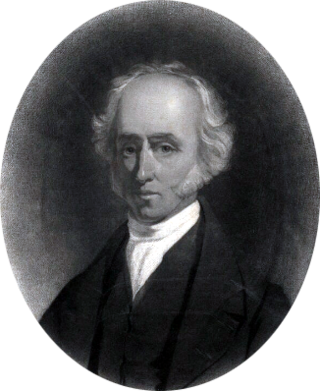
Robert Gordon FRSE was a Scottish minister and author. Originally prominent in the Church of Scotland, and serving as Moderator of the General Assembly in 1841, following the Disruption of 1843 he joined the Free Church of Scotland and became a prominent figure in that church.

The Canongate Kirkyard stands around Canongate Kirk on the Royal Mile in Edinburgh, Scotland. The churchyard was used for burials from the late 1680s until the mid-20th century.

Greyfriars Kirkyard is the graveyard surrounding Greyfriars Kirk in Edinburgh, Scotland. It is located at the southern edge of the Old Town, adjacent to George Heriot's School. Burials have been taking place since the late 16th century, and a number of notable Edinburgh residents are interred at Greyfriars. The Kirkyard is operated by City of Edinburgh Council in liaison with a charitable trust, which is linked to but separate from the church. The Kirkyard and its monuments are protected as a category A listed building.
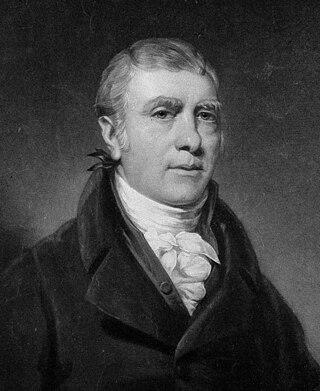
John Barclay was a Scottish comparative anatomist, extramural teacher in anatomy, and director of the Highland Society of Scotland.

Andrew Duncan, the elder FRSE FRCPE FSA (Scot) was a Scottish physician and professor at the University of Edinburgh. He was joint founder of the Royal Society of Edinburgh.
James Dunbar FRSE FSAS LL.D. was a British philosophical writer. He was a co-founder of the Royal Society of Edinburgh in 1783.
James Robertson FRSE (1714–1795) was a Scottish orientalist. In 1783 he was a founding Fellow of the Royal Society of Edinburgh.
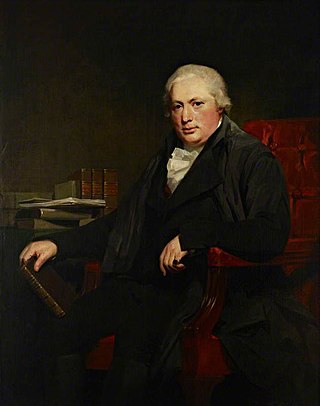
Andrew Dalzell FRSE (1742–1806) was a Scottish scholar and prominent figure during the Scottish Enlightenment. In 1783 he was a co-founder of the Royal Society of Edinburgh.
Cosmo Gordon of Cluny FRSE (1736–1800) was a Scottish politician, agricultural improver and co-founder of the Royal Society of Edinburgh. He sat in the House of Commons from 1774 to 1777 and was a Baron of the Scottish Court of Exchequer from 1777 until his death. He was for several years Rector of Marischal College in Aberdeen.
Alexander Hamilton FRSE FRCSE FRCPE (1739–1802) was a Scottish physician. He was a co-founder of the Royal Society of Edinburgh in 1783. He was one of the first persons to recognise that puerperal fever was infectious. He was professor of midwifery at the University of Edinburgh.
References
- 1 2 Biographical Index of Former Fellows of the Royal Society of Edinburgh 1783–2002 (PDF). The Royal Society of Edinburgh. July 2006. ISBN 0-902-198-84-X.
- ↑ "Papers of Aberdeen Philosophical Society (1758 - 1773) - Archives Hub". archiveshub.jisc.ac.uk.
- ↑ The Scots Magazine vol 59
- ↑ Gentlemans Magazine and Chronicle 1797, p.531
- ↑ "Collection: Transcripts and notes concerning the "Brown manuscript" of Scottish popular ballads | HOLLIS for". hollisarchives.lib.harvard.edu.